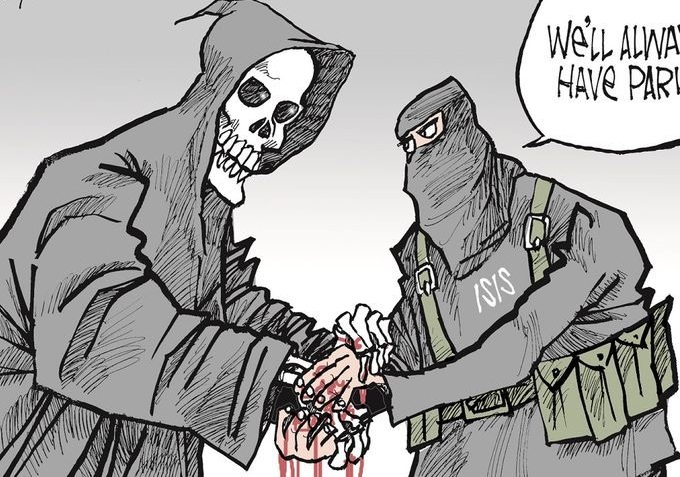A detailed study of the road to radicalisation among Muslim extremists in Britain has identified six individuals as being key to the overall problem. Produced by the Tony Blair Institute for Global Change, the report, “For Caliph and Country: Exploring how British jihadis join a global movement” explores the connections between extremists across the UK, and how they made their journey to extremism.
Muslim fighters from Britain have played an active role in conflicts in other parts of the world for about 30 years. For the generation that was born in the 1970s, and came of age in the 1980s, the defining struggle of their time was the Afghan jihad against the Soviet Union, in which the Mujahideen forces, assisted by many thousands of fighters from across the Muslim world, and indeed from Europe, managed to defeat the Red Army occupying Afghanistan — with the active support of the CIA.
They were followed by those who were born in the 1980s, and came of age during the years leading up to 9/11 and its aftermath; they took part in the civil wars that raged across the Middle East and Africa.
But the foreign conflict that has attracted the most number of British Muslim fighters has been the Syrian war. Those who were born in the 1990s, and came of age during the time of the Arab Spring, were primarily drawn to the brutal conflict in Syria, which has been going on for more than six years now. The study examined the lives and paths to extremism of 113 men, and 18 women.
Unsurprisingly, a big majority — 64 per cent — have primarily fought in three theatres of war: Syria/Iraq; Pakistan/Afghanistan; and Somalia/Kenya. Less than a fourth of the sample also targeted Britain.
The research sample reflects a cross-section of British Muslim extremists, from senior ideologues to foot soldiers; from the very wealthy to the poor; and from excellent students to drug dealers. Over two thirds of them were found to have links to six individuals — Abu Hamza Al Masri, Abdullah Al Faisal, Abu Qatada Al Filistini, Omar Bakri Mohammad, Anjem Choudhary, and Hani Al Sibai.
Most of those surveyed had, at one time or the other, been associated with non-violent Islamist groups in the UK, indicating that these groups may serve as recruiting pools for extremists. London’s domination of the British extremist scene was undisputed, with half of those surveyed being based in the capital.
Many of Britain’s extremists also tend to be well-educated, and have studied the STEMM subjects (science, technology, engineering, maths, and medicine). Interestingly, this finding seems to give credence to the theory that certain “educational mindsets” are more susceptible to extremism — those that are drawn towards clear-cut answers, and avoidance of ambiguity. Such people also seem to see the world in black and white, leaving out any shades of grey.
Extremism among Muslim radicals in the UK appears to be inspired by global events — the extremists adopt the causes that capture the most attention in the wider Islamist movement when they themselves come of age. Their network is connected to the global Islamist movement through their activities overseas, and their support for international groups from within the UK. Unlike foreign fighters and Muslim extremists from some other European countries, say France or Belgium, very few British extremists — 13 per cent of those surveyed — have spent time in prison for crimes not linked to militancy. In other words, the vast majority are not drug dealers, thieves, or violent offenders.
After the Afghan war of the 1980s, the Syrian conflict has seen the biggest gathering of foreign Islamist fighters. Interestingly, however, very few of those who fought in the Afghan war took part in the Syrian war — only 4 of the 113 extremists surveyed. Of the individuals connected to Islamist networks, 50 per cent of them were linked to the now-banned Al Muhajiroun or one of its splinter groups. Another Islamist group that appeared on the radar was Hizb-ut-Tahrir. One of the six influential individuals listed here, Omar Bakri Mohammad, was the leader of the UK chapter from 1987 to 1996. Established in 1953 in Occupied Jerusalem, the group seeks the establishment of a ‘caliphate’.
The results of the survey clearly indicate that UK faces a problem when it comes to the spread of extremist ideology and groups. Two of the recommendations of the Tony Blair Institute for Global Change were that an educational environment be created in which extremist ideas are openly challenged, and that authorities target hubs that spread extremist messaging.







































admin in: How the Muslim Brotherhood betrayed Saudi Arabia?
Great article with insight ...
https://www.viagrapascherfr.com/achat-sildenafil-pfizer-tarif/ in: Cross-region cooperation between anti-terrorism agencies needed
Hello there, just became aware of your blog through Google, and found ...